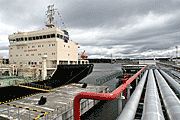| Official internet-portal of St. Petersburg, cultural capital of Russia | |
| Petersburg CITY / Guide to St. Petersburg, Russia | http://petersburgcity.com |
|
Printed from: http://petersburgcity.com/news/business/2004/06/21/lukoil/ Business news, 21.06.2004 16:25 Stakes Run High for Oil Spot Meanwhile, experts say, the terminal, located within several kilometers of the Vyborgsky nature reserve, will hardly bring any revenue to the Leningrad Oblast and may put the area's vulnerable ecosystem in danger.
Meanwhile, experts say, the terminal, located within several kilometers of the Vyborgsky nature reserve, will hardly bring any revenue to the Leningrad Oblast and may put the area's vulnerable ecosystem in danger.
"This is a case where the interests of a company and the state coincide," Russian Prime Minister Mikhail Fradkov said during his visit to the terminal's opening ceremony.
The terminal and the adjoining port are expected to bring significant funds to the federal budget, previously collected by the ports in Lithuania and Estonia.
Trans-shipment of oil through Lukoil 2 is estimated to cut oil export costs by up to $7 per ton.
"The new terminal is Lukoil's contribution to Russia's economic safety," posters adorning the ceremony said. Amounts said to range from $150 million to $225 million have been invested in the project. With oil prices remaining high, all investments should pay off within 11 months after the terminal begins working at its full capacity of processing nearly 11 million tons per year, said Lukoil's vice president Anatoly Barkov. Lukoil had obtained all of the investments on loan, Barkov said.
Lukoil formed a partnership with Overseas Private Investment Corporation or OPIC, which allowed it to get U.S. government guarantees for a loan from an American bank, said Charlie Sands, senior vice president of Fluor, an American contractor working with Lukoil on Vysotsky. Fluor is hoping to continue its cooperation with Lukoil in the upcoming project in Varande in the Barentsevo Sea. Lukoil also plans to work on another terminal in the Northwest, in Ust-Luga, Barkov said.
Meanwhile the terminal will hardly bring much revenue to the local economy. Transneft's Primorsk terminal, when working at a capacity of 12 million tons, was calculated to bring annually as little as $1 per capita to the residents of the Leningrad Oblast, analysts say, as most of the taxes go to the place of the company's registration. Lukoil is registered in Moscow.
The new port, equipped with three docks, will be able to host three 80 million ton tankers simultaneously and over 160 per year, said Sergey Kiselyov, the terminal's deputy general director. All the oil storage reservoirs have double walls and the tankers are double-bodied, which should prevent leaks completely, Kiselyov said.
An additional third layer of protection also surrounds the reservoirs. The site is equipped with heating cables to prevent pipes freezing, while vibration diagnosing will be used to check the condition of the equipment and foundations. All the tankers are ice faring vessels. Lukoil is reported to have spent 18 percent of its investments on environmental safety.
However, with much of the monitoring and regulation carried out by oil companies internally, and not the state, the dispersion of oil terminals in the region has become alarming, said environmental expert Alexander Sutyagin in a telephone interview Thursday.
Transneft is planning to increase its turnover in its Primorsk terminal up to 62 million tons, while Lukoil may go up to 20 million and Rosneft is developing a 25 million-ton terminal in the same area.
The capacity growth will require increases in cargo circulation. That means tankers will be making several thousand trips in the Gulf of Vyborg, frequently crossing the Lake Ladoga and doubling the load on the River Neva, which is already overstrained with traffic, Sutyagin said.
Each company is responsible for a 5 to 10 kilometer area around the terminal - the radius of a large oil spill - and the rest should be controlled by the Ministry of Transport, which is not done properly due to lack of finance.
"Russia is a large country and is able to solve problems on its own," said Bartkov in response to a question on environmental checks.
Russia did not sign the international convention on trans-border strategic environmental assessment. Every country with an outlet to the Baltic Sea conducts air or even space monitoring of its zone, excluding Russia, Sutyagin said.
The Gulf, which had to be deepened to allow the large tankers to pass, forms spawning grounds for a variety of fish species. While the damage inflicted by each terminal separately may be within the safety margin, the total impact may kill some spawning grounds completely, Sutyagin said.
Meanwhile most of the local population makes their living from fishing, not from oil. A terminal cannot employ more than 200 to 300 people. A fisherman in Vysotsk told Sutyagin that much of the bream and smelt are gone already, and there would be nothing to fish for once the Baltic herring is gone.
News source: www.times.spb.ru
| |
| (c) 2000 PetersburgCity.com E-mail: contact@petersburgcity.com | |